Every new Hearthstone expansion brings shakeups to the game’s Standard format, and Titans looks to be no exception. No one can know for sure which decks will come out on top once the dust settles, but we’ve decided to throw our hat into the ring, and place our own bet as to what the future of Standard Hearthstone will look like, starting with the game’s latest class, Death Knight. Thanks to the new Plague package, Death Knight is one of the most hyped-up classes going into Titans standard, but it has a few other viable build options as well. Read on for our take on the best Death Knight decks for Hearthstone’s Titans expansion.
Which Death Knight decks will dominate Titans Standard in Hearthstone?
Plague Death Knight
Deck Code: AAECAfHhBAKT+wXt/wUO4PYE6/8F0e0E9fcFgvgF+4AG0/EEh/YEiPYE8vgFu/kFsvcEz8gFo/oFAAA=
First up we have the new kid on the block, Plague Death Knight. This deck centers around the Plague mechanic, wherein 1-cost spells that damage your opponent and disrupt their plans once drawn are shuffled into their deck. While irritating, these Plagues aren’t enough to win the game on their own, until you throw Helya into the mix. This is one of Death Knight’s new legendaries in Titans, and she not only shuffles three Plagues in herself, but also makes the Plagues your opponent draws shuffle back into their deck for the rest of the game.
This gives you inevitability, meaning if you can play Helya and just outlast your opponent, you will definitely win the game. At a certain point their deck will be more Plague than anything else, and they’ll be looping through Plagues, taking lots of damage and granting you lots of minor advantages in the process. To ensure this happens, we play the full suite of Plague shufflers here: two copies each of Distressed Kvaldir, Down with the Ship, and Staff of the Primus, alongside Helya herself, of course. With all of these together, you can shuffle up to 17 Plagues into your opponent’s deck. With such a high ceiling, you can afford to play your Plague shufflers for tempo early without worrying about not creating enough unending Plagues with Helya.
This tempo strategy also synergizes nicely with Chained Guardian and Tomb Traitor, two immensely powerful payoff cards for running the Plague package in your deck. The former is a huge reactive threat with Reborn that can easily cost little to no mana, and the latter is a hyper-efficient board clear, ideal for combating aggressive strategies that can overwhelm the deck before it gets the Plague engine going. To support the core of the deck, we run strong card draw options like Runeforging, Chillfallen Baron, Metrognome, Remorseless Winter, and Saronite Tol’vir. These help us filter through to our key cards, particularly Helya, who is very much the heart of the deck.
For a deck that expects to go long we run a fairly low curve, but The Primus, the new Death Knight Titan card, is our one concession to heavy late-game value. It offers hard removal, board presence, or mana cheating, in addition to card advantage via Discover, making it a great play at any point in the game. The overall strategy here is to stay low, control the board, shuffle in Plagues when you can, and play Helya as early as possible to start racking up that Plague damage.
Blood Death Knight
Deck Code: AAECAfHhBAiX7wSE9gSJ5gSs0QXYgQbipAXt/wXlsAQQlOQEqIEFieQE4MgF9OME8cIFtvoEleQEs/cEq4AFj+QFh/YEo/oFlrcEr/kFtvkFAAA=
The definitive Death Knight deck since launch, Blood Death Knight looks to be just as good going into Titans standard. It retains access to its full suite of powerful control tools, like Soulstealer and Vampiric Blood, while also gaining some spicy new tools in Ignis, the Eternal Flame and The Primus.
The general gameplan with this deck is the same as always: deal with everything your opponent plays through removal and board clears, stabilize with big healing cards like Death Strike and Gnome Muncher, then drop big threats like Alexandros Mograine and Screaming Banshee to finish things off. Ignis joins the finisher lineup, and should generally create a ten-cost weapon when played, since those can deal over 30 damage by themselves. To enable him, we’re running four Forge cards: two copies of Eulogizer, a solid tempo play early, and two copies of XB-488 Disposalbot, an additional source of removal and lifegain.
The Primus is also a fantastic fit for this deck, with its Runes of Blood ability being an excellent way to remove a big threat, gain a lot of health, and put your Primus out of reach of removal in one fell swoop. The other two abilities are solid as well, since they let you Discover extra cards, but Runes of Blood will be your go-to opener in most scenarios. Photographer Fizzle is a fun addition that lets you double down on some of your most powerful plays if timed well, while Alkexandros Mograine reprises his role as an inevitable win condition, by dealing three damage to your opponent every turn after he’s played.
Overall, Blood Death Knight hasn’t changed too much with the release of Titans, but the new cards it has received will keep it competitive with the other classes, and could very well lead to it retaining its spot as the best control deck in the meta going forward.
Rainbow Death Knight
Deck Code: AAECAfHhBAbLpQWhqgWJ5gTt/wX8+QWT+wUMj+QF0e0EgvgFh/YE+PkFiPYE8vgFs/cEvvcEsvcE3YIFmMQFAAA=
While the most popular flavors of Death Knight so far have been those that commit fully to a single Rune, usually Blood or Frost, support for a three-Rune build, known colloquially as ‘Rainbow Death Knight’, has been growing over the last few expansions. This build sacrifices raw power for flexibility, and gets to play all of the best single-Rune cards as a result, including Patchwerk and Thassarian.
Much of the deck is made up of solid standalone cards like Gnome Muncher and Hollow Hound, but there are synergies on offer here too. Climatic Necrotic Explosion, Death Knight’s legendary spell from the Festival of Legends expansion, is one of the big payoffs for playing a three-Rune deck, and we include a range of Corpse-spending cards to optimize its power. These include Bonedigger Geist, Defrost, Mosh Pit, and Boneguard Commander. With enough setup, the Explosion can swing a game completely in your favor, or just win it for you on the spot.
We also include Frost Queen Sindragosa, Death Knight’s two-Rune Colossal minion, which can remove two big targets while developing your own board for a modest seven mana. In terms of additions from Titans, we include some of the Plague package, specifically Helya, Down with the Ship, and Tomb Traitor, which provide both a late-game win condition and early-game tempo. Naturally, we also run The Primus as well. It may not have a Rune requirement, but it’s one of the best pound-for-pound Death Knight cards in any scenario, and fits just as well here as it does in the two above decks.
This deck plays a bit more aggressively than the other options we’ve presented here, but still has plenty of late-game staying power thanks to The Primus and the Plague package. It’s a great choice if you want to try a more offbeat take on the Death Knight class, and may just surprise you with how well it performs, against aggressive decks in particular.
So there you have it: three delectable Death Knight decks that we consider to be the best options for Hearthstone’s Titans expansion. Each lets you explore a different facet of this complex class, and each lets you try out the class’s new Titan, The Primus, undoubtedly one of the more exciting cards from the new set.

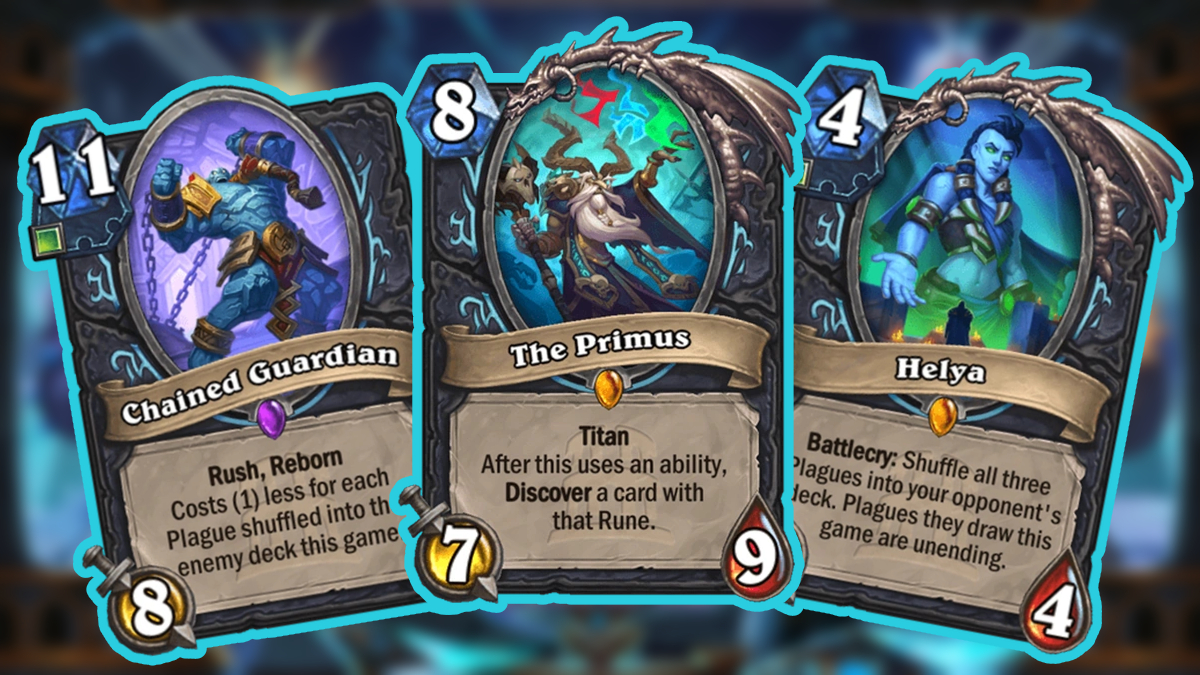
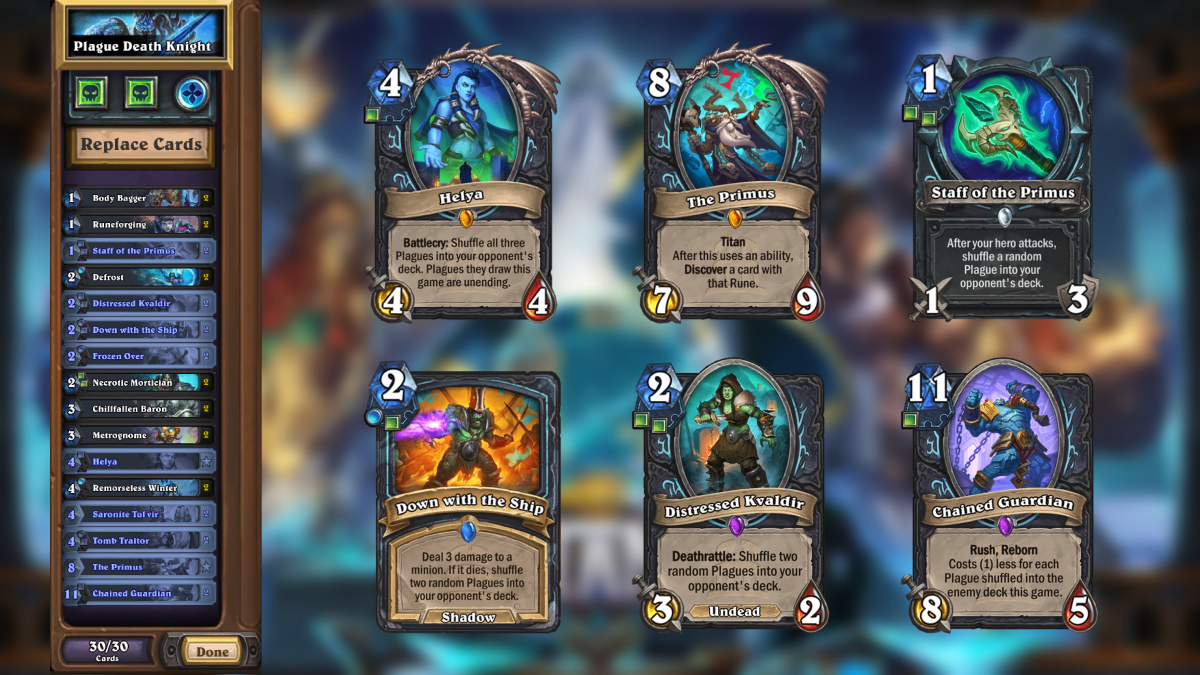
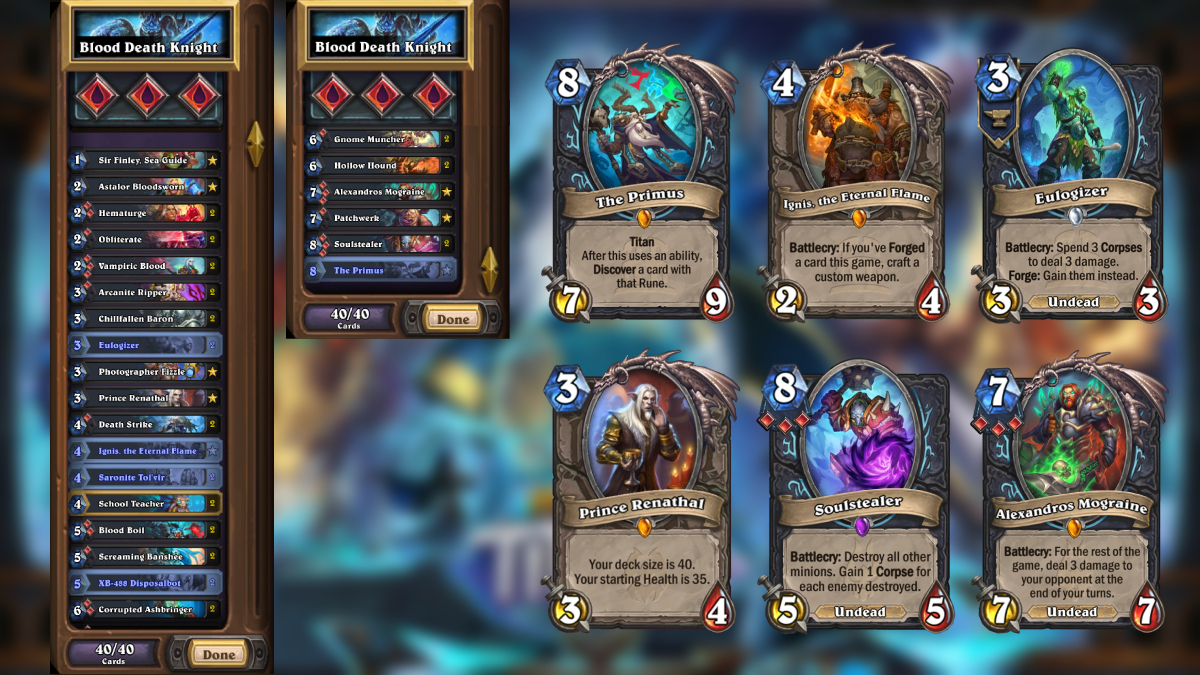
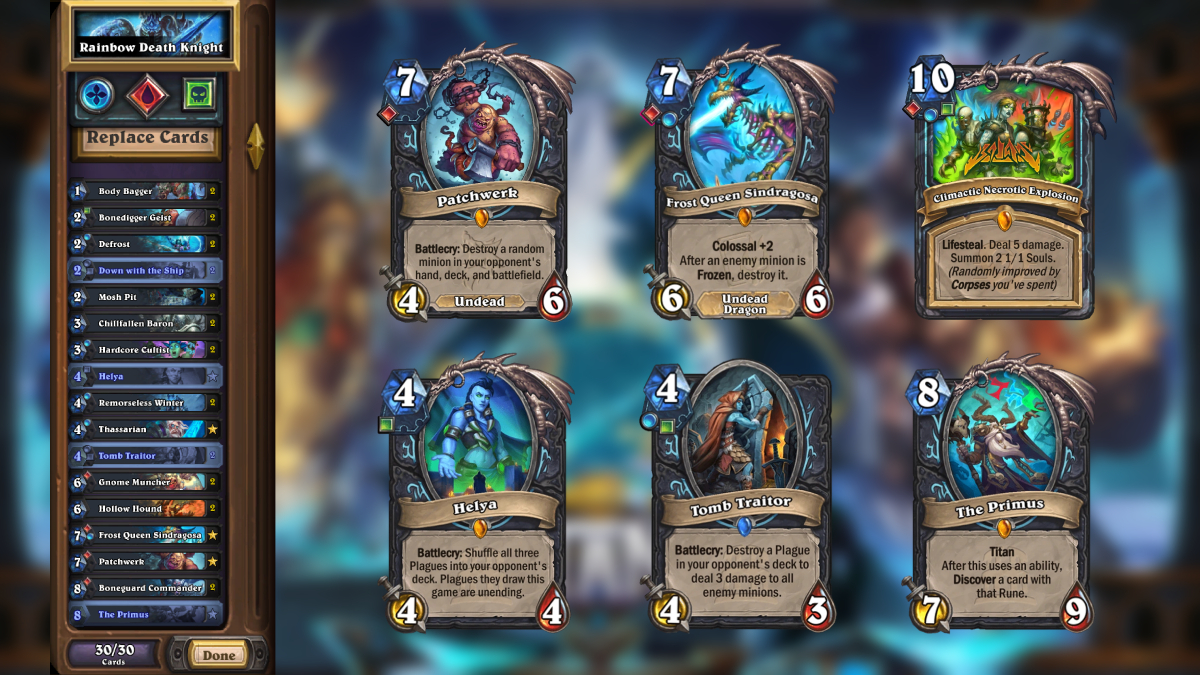


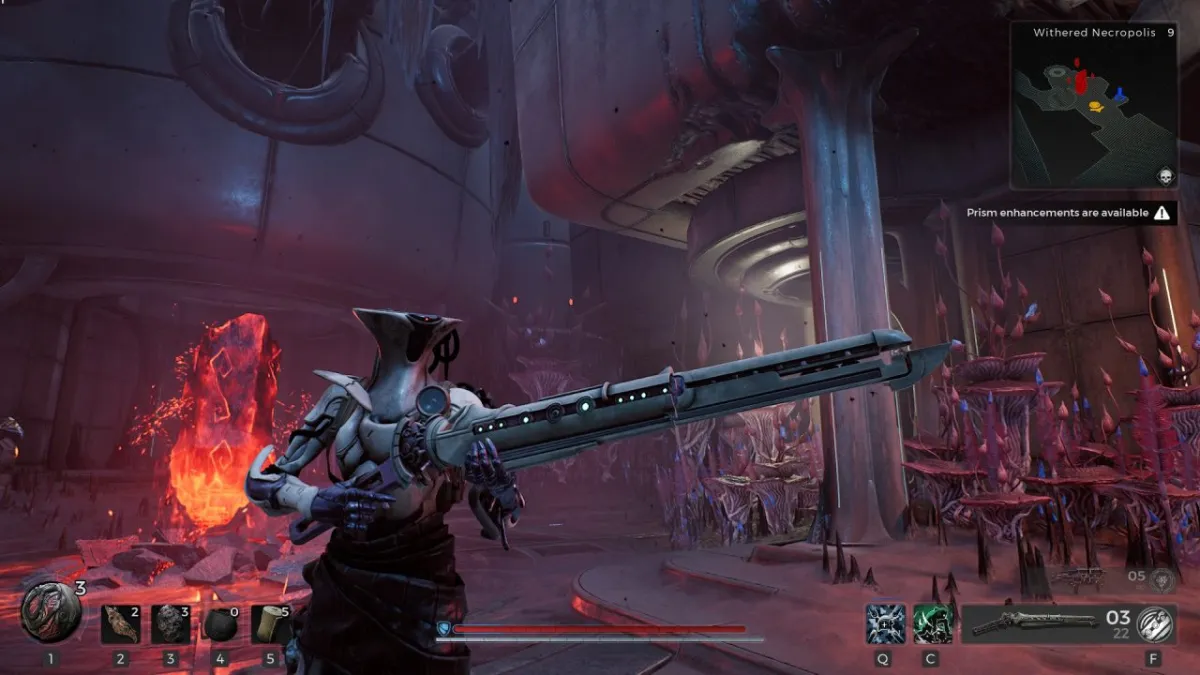


Published: Jul 27, 2023 09:55 am